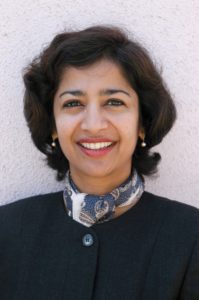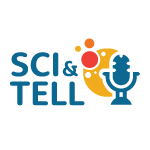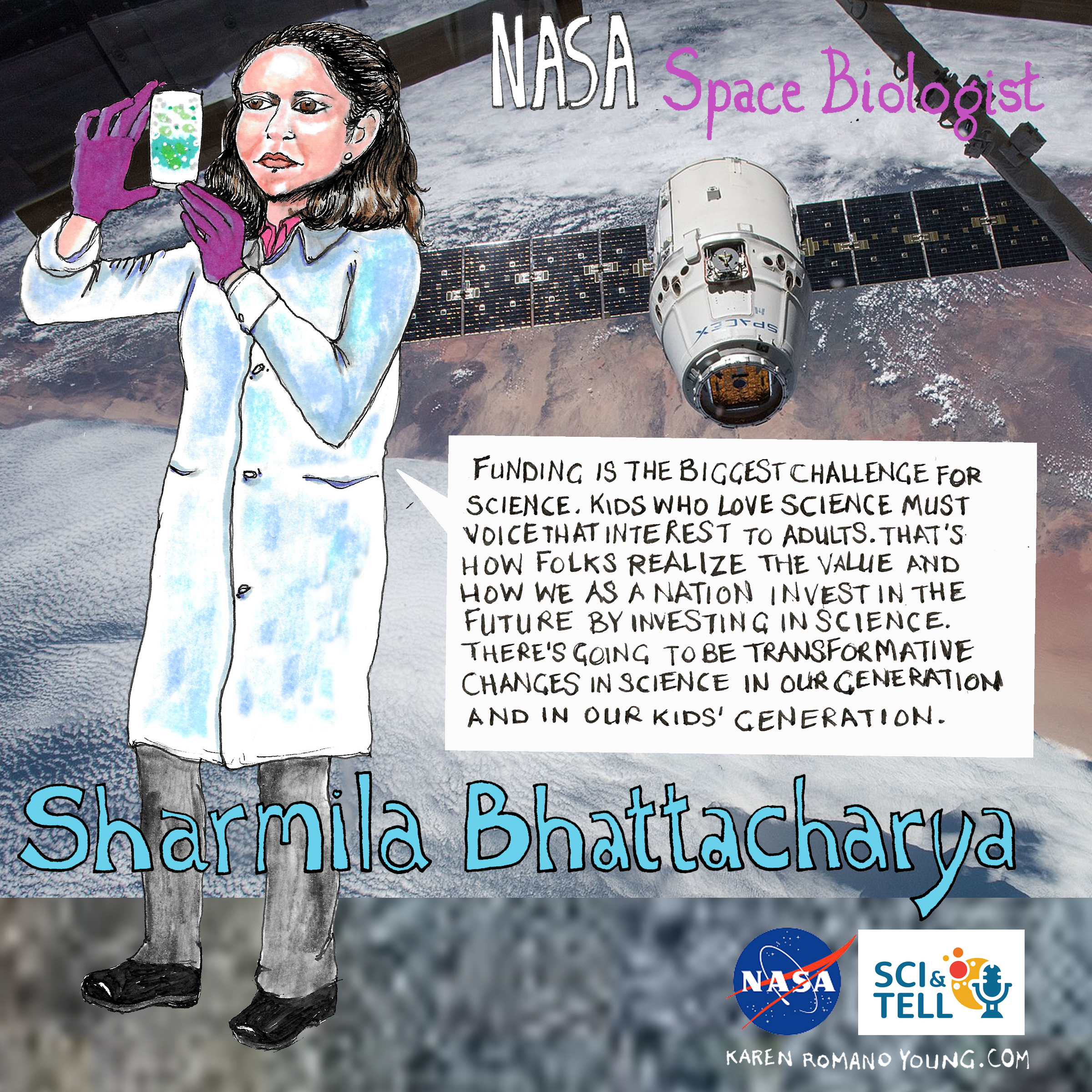Sharmila Bhattacharya: Helping Humans in Space & at Home
04 January 2021

If Sharmila Bhattacharya wasn’t Program Scientist for Space Biology at NASA Headquarters, perhaps she would've been a theater actress. And while her contributions on stage would likely be legendary, we’re happy to have her at NASA learning about how space affects (human and other) biology. We talked with her about the challenges that scientists face, her proudest achievement (it’s not science-related), and that aforementioned theater performance.
This episode was produced by Shane M Hanlon and mixed by Collin Warren. Artwork by Karen Romano Young.
Transcript
Shane M Hanlon: I’m an ecologist by training. I spent all of grad school outside in rural Tennessee hanging out with frogs, salamanders, and turtles. The lab I was in wasn’t exactly well-funded so we had to work with the limited resources we had. I’ve heard stories from folks about the weird Walmart runs they’ve had but for me it was more about my dual role as scientist and groundskeeper. One day, after weed wacking, (or eating, whatever you call it) around one of our outdoor areas where did experiments, I slowly noticed that I was having some trouble breathing. Not shortness of breath – trouble getting the area through my throat into my lungs. I realized that my throat was closing up. When I was wacking earlier, I had failed to notice that there was poison ivy mixed in with everything else, so when machine hit the ivy, it threw little particles into the air that I ended up breathing in. As my throat was closing, I made a call to my doctor who wrote me an emergency prescription for a steroid and suggested I immediately chow down on some Beonydryl. I ended up being OK and after a few days I was back to normal. I now have a house w/ some land and love doing yard work…but I’m always on especially high alert for poison ivy
Shane M Hanlon: Everyone has a story, even, or maybe especially, scientists. Science affects each and every one of us. Let's talk about it. From the American Geophysical Union, I'm Shane Hanlon, and this is Sci & Tell.
Shane M Hanlon: Welcome to episode TWO of Sci & Tell. If you missed our kickoff with Karen St. Germain, it’s one up in your feed or at sciandtell.org. For this episode we chatted with Sharmila Bhattacharya, Chief Scientist for Astrobionics at NASA Ames Research Center. Basically, she studies how space affects humans. And while she doesn’t have a story about poison ivy, she’s definitely had some interesting encounters in the field. Our interviewer was Paul Molin.
Sharmila Bhattacharya: So my name is Sharmila Bhattacharya, and I work for NASA, NASA headquarters. And so, I'm a scientist. And my role is, I'm the program scientist for NASA Space biology program. So this is a program that's interested in looking at the fundamental biology of how systems respond to the space environment. And so, my job specifically is to help NASA make strategic plans and prioritize the science that we do so that we can keep, so we understand how to sustain habitation as well as exploration, when astronauts go into deep space for periods of time, we have to understand how to keep them safe, how to send food with them, and all of this good stuff, as well as do science, alongside that to understand the underlying changes that happen to systems in space, so that in the big picture, then at the end of the day, we can keep humans safe in space.
Sharmila Bhattacharya: As you know, now NASA works alongside many of these, the SpaceX and the Northrop Grummans and the Blue Origins, today, so that we can work as partners to getting things into space. And my interest is, of course, in ensuring that we get the science reliably and frequently into space so that we can do our investigation.
Sharmila Bhattacharya: I really enjoyed science, but I also loved English. So, I loved writing, I loved reading, I still do. So literature, was something that was very near to my heart as well. I loved maths, I liked physics, I liked biology, I loved chemistry, I loved history, right? So in some ways, it was a tough choice. So when it came to choosing the one path, it was a little bit of, what's the word? A toss up. And then it struck me that okay, if so, which part of science, so let's say if I want to do science, which part of science do I love?
Sharmila Bhattacharya: And then I think, biology for me, was what came to mind. And then I thought, okay, and I love writing, but then in biology, and frankly, this is something that maybe a lot of young folk who are interested in science careers may not think about, but writing and communications, and reading, and literature, all of this actually tie in, and history, tie in very much together, because no matter how good your science is or how well your experiments go, if you can't communicate that, and if you can't write grants effectively, then you don't get funded or if you don't communicate effectively at a conference, then your colleagues don't understand what work you're doing and then you may not, meant will not have done it right.
Sharmila Bhattacharya: So communications, writing, english, all of these actually flows very nicely together with science, and so at the end of the day, I think as I grew in age, and maturity and experience, I realized that it's not really that much of an either or.
Sharmila Bhattacharya: I think, the biggest challenge is funding. So science, and it's something, Paul that I think, it jumps out at us today, as we're in the middle of a COVID pandemic, where, what are we looking to as the holy grail that's going to get us out of this? It's science, right? It's the vaccines that are going to be developed, it's the interventions, it's those medications, it's the drugs, that is what's going to get us out of this.
Sharmila Bhattacharya: And so, I think what sometimes we as a people, as a nation, and perhaps, even sometimes globally, what we forget, we take science for granted, we assume it's going to bail us out of situations, but we often don't fund it to the extent that would really be helpful when we need it. And if you think back, to the heydays of most nations, including ourselves, and we think of the Apollo era, we think of sending humans to the moon for the very first time, right? It was all based on having a solid foundation of funding for the nation for science. I think so, when I look back, just at even from my personal standpoint, as a scientist having a career in science, I think the biggest challenge for most scientists is the funding.
Paul Molin: If you could be doing anything else you think with your life, if you didn't end up in the sciences, what do you think you would have done?
Sharmila Bhattacharya: Theater, 100% theater. Yeah, I did a lot of plays and theater, growing up in school K through 12. I love that world. And then of course, as I got to college and things just got busy. And I was majoring in biological chemistry, not theater. So, I didn't even have time to take theater courses actually in college. But then in grad school, actually, I did participate again. So, high school, I'd done some even semi professional type stuff. And then in grad school, then I worked with some other groups outside of the university.
Sharmila Bhattacharya: And we put some small community type theater that I participated in that I loved, but that's the thing is, as you get more and more focused on your expertise, your area of expertise, and in your career, you really got to pick one, and I love both, but I really did love the science and of course, it's hard to make a living off of theater. Not that it's that easy making a living out of science, but out of the two, since I love both, I figured, maybe someday I'll get back to theater and I certainly attend the theater a lot to watch others on stage. I just love it, but maybe when I retire, maybe I'll go back to some aspect of theater, if I can.
Paul Molin: What was your favorite role you ever played in?
Sharmila Bhattacharya: Oh, goodness. So, there was this play that we did about. So, it was a play about Alan Turing. He was English, and he was the person who actually broke the code for World War, I want to say to World War Two, the German code, during the war, and that was a huge turning point for the allies.
Sharmila Bhattacharya: And so, there's a story about his life and so we did that as a play. I played a role as a lover for Alan Turing, and I really enjoyed, because actually, more than anything else there again, I enjoyed learning about his life and he faced challenges like you wouldn't believe. And just learning about his challenges and how he handled it and lived to still produce something that was so critical for the country, I guess, maybe that would have probably been my most fun role.
Sharmila Bhattacharya: The thing that I think in life, in general, that I'm most proud of, is having raised a decent, kind, intelligent, and loving human being, which is my daughter. At the end of the day, if I had to think of what is the one thing that I am really proud that I spent a lot of energy and time doing, it is raising a good human being, a good citizen for the future.
Paul Molin: Your greatest personal achievement is, the woman your daughter turned out to be. You don't do that without having a grasp on work life balance, and being able to know, prioritize. What advice would you give on how you're able to manage that work life balance?
Sharmila Bhattacharya: I think the main thing is, I just really enjoyed parenting, I loved spending time with my daughter, I love doing the things together that we did.
Sharmila Bhattacharya: So I think the main thing is to look upon it as fun. And of course, it's not always fun, we who are parents know. There will be days when they're sick, there are days you have an important meeting where you can't, where you've had to prepare, and you just can't take a breather for days on it. And that's where I think actually having supportive friends and families and partners around you can be a huge help. And that's how it was, for me very fortunately, I was able to rely on help, whether it was from my partner, whether it was from my mother, who on occasion would come and stay with us when my daughter was young, my husband and I always juggled our schedule, so that we would never go out of town on work travel at the same time.
Sharmila Bhattacharya: So, it takes coordination and we had friends and neighbors who were this amazing, supportive community who we could rely on, my friend and neighbor across the street, Barb, she was like a second mom to my daughter, on many occasions. So, it's all, as they say, it takes a village to raise kids and it's so true, building that support network and having that group around you is really good, not just for working parents, but also I think for the kids.
Paul Molin: Did your daughter end up in the sciences?
Sharmila Bhattacharya: She did, actually. She majored in biological chemistry at Brown University. So yes. Now, she's very interested, of course, also in business and commercial companies. So, she's working in healthcare consulting company after graduation. But yes, she's definitely a very analytical thinker, and very interested in science, for sure.
Sharmila Bhattacharya: One of the reasons, I think it's very important to have these conversations hat you and I are having today, is that it's important to communicate to people, whether it's to my mother, or to my grandmother, or to my uncle, what it is that we do, and why it's important, and how it contributes to society, is a very important dialogue for us to continue to have.
Sharmila Bhattacharya: And so, for those kids who love science, it's important for them too, to voice that interests to the adults around them, because that's how folks realize the value, and that's how we as a nation, invest in the future of our country by investing in science, going forward.
Sharmila Bhattacharya: One more thing I would say, yes, the first about raising their voices, being an important part of the nation's discussion, as they are doing today in politics and in many other things, and they need to continue to do that. In addition, one thing I would say to our young scientists, that, a career in science is really fun. And it is something that you can be sure of will never get boring, will never be repetitive. It's collaborative, and also people sometimes have this view of that scientists are siloed in their own little world, and you don't talk to anybody. No, science is a community, as we were saying earlier, it's all about communication and collaboration, and partnering and talking to other scientists, and exchanging ideas and working as a team, across disciplines.
Sharmila Bhattacharya: You are really interested in biology, but somebody else and their computer science skills, and somebody else with their math skills, and somebody else with their mechanical engineering skills, together build an experiment and build the hardware to do in space. And that's how we do it. I work with folks in the planetary science and earth science and computers, and engineering and all of us together, make it happen. And so, it's really fun. You never stop learning, you're forever learning new things, and I love that.
Shane M Hanlon: I’m with Sharmila on this one. I love learning. Years ago when I was that grad student and sometimes landscaper, I would’ve laughed folks out of the field if someone had told me I’d be a professional science communicator, storyteller, and podcast host…all while still being in the sciences. I’m definitely inspired after listening to this story and I wanna thank Sharmila for sharing it with us.
Shane M Hanlon: Special thanks to NASA for making this episode possible and to Paul Molin for conducting the interview.
Shane M Hanlon: If you like what you've heard, stay tuned for future episodes. You can subscribe to Sci & Tell wherever you get your podcasts and find us a sciandtell, all spelled out, .org.
Shane M Hanlon: From this scientist in the studio, to all of you out there in the world, thanks for listening to our stories.

